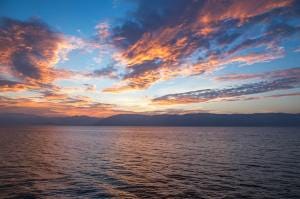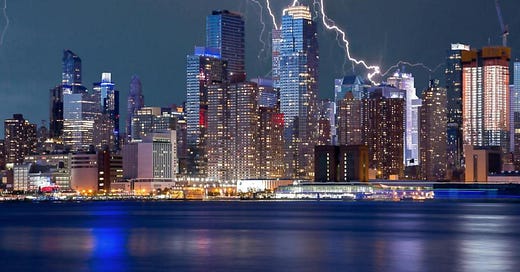Womanist Musings: I Am the Storm
During this holiday season, I have had the pleasure of living just a few feet away from the sea. Friends often want to know "Where are you now?" I don't always answer. Sometimes, it's important to just be - to exist without an explanation or a description. Sometimes, I just need to sit with my own thoughts and re-direct my own energy.
Where I'm located, we had a storm that came through. Yesterday, I got soaked. The rain was a fine rain, but the wind pushed the rain against and around us - soaking anyone who didn't have on long coats or sturdy umbrellas.
But in those moments of discomfort, I began to think about how we experience storms, both physically and metaphorically. Why do we feel anxiety toward them? What if a storm could provide us with something good and beneficial? It occurs to me that, one of the reasons people resist diversity, is that they believe diverse voices represent the same type of all-encompassing, soaking and alternative energy that decenters the taken for granted knowledge and norms that have been established.
As a Black, African descended woman, I feel that I have "grayed" some of the White spaces that I inhabit - especially as an academic. There's this energy when we listen to a "work in progress" paper, for example. The expectation is that we will all listen and then we will clap at the conclusion and say very gentle, interesting things that affirm the speaker's conclusions. Or, if we differ in some way, we do so in a very indirect way so as not to offend.
There's a couple of concerns with that, however. When a person of color is the speaker, they are rarely afforded the same gentleness. And, when a person of color speaks, they are seen as being too abrupt or "confrontational." Add that to the assumptions that women in general are "emotional," then Black women who disagree are seen as angry and aggressive. Our Black presence provides a "graying" of the White space. I came up with the term of "graying" a White space, based on my former life as a teacher. I noticed that, if you are coloring with paints, you can stir in just one drop of black paint into the white paint. After you stir it together, you get a gray color.
I also should note that I capitalize "White" when identifying race. I do this to amplify that "White" is a metaphor for power within a racialized hierarchy. There's no point in highlighting the significance of "Black" as a metaphor for a shared history and socio-political location, without also highlighting the significance of "White." To ignore it with a small "w" is to imply that it is universal, the standard that is so taken for granted it need not be acknowledged as a form of power.
But it is a form of power! And, like "White" is a form of social power, a storm is a form of power within nature.

Have you ever experienced a sunny day, but thought, "A storm is coming." What's odd is that, when there isn't a cloud in the sky, you can sometimes smell that a storm is headed your way. Sometimes, you can see the gray clouds on the horizon. Even though they appear to be stationed elsewhere, they are headed straight for you - you just feel it.
I am, indeed, both the power of the warm affirming sun, and the stealth of the storm. But in "White" spaces, I am primarily seen as being the storm. I am that shift in the wind. I call out the status quo and I challenge taken for granted knowledge as a ethicist and rigorously trained theologian.
And, I am unrelenting.
My wind and my rain clears out the rude people at the beaches, the dog feces left on the sidewalks, the pollen that caused nostrils to swell. Without me, you would think your sunny days are nothing more than peaceful and tranquil. But the callousness and filth that are always beneath the surface in your White spaces, that must be cleared out.
So, when I raise my hand to inquire about why someone uses womanist frameworks but doesn't give them credit in their presentation, my insistence on citational integrity may be experienced as a storm. When I raise my hand to inquire why all the efforts to eradicate colonialism in academia are headed by White colonizers, I appear to wash away that tranquil notion of the status quo which, primarily, is unchallenged.
When I dare to assert my Blackness into publications without apology, exploring the hermeneutical lens of Whiteness and its insidiousness within religious scholarship - I am the wind blowing away the myths of objectivity. And, when I plant my seeds of academic inquiry across religious scholarship, history, women and gender studies, Pan Africanism and cultural studies - I invite a stillness for those who thought they could block my scholarship from gaining an audience.
So, I say to all the African descended women whose work has been overlooked, under-appreciated and pushed to the side: stop looking to the wrong places for affirmation. Do not make yourself smaller to accommodate Whiteness, a power structure which can only flourish by holding you back.
Instead, embrace who you are.
Embrace who we are.
We are ... the storm!



